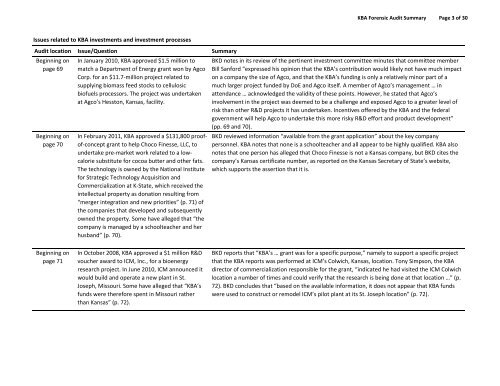Complete 2012 forensic audit documents - Kansas Bioscience ...
Complete 2012 forensic audit documents - Kansas Bioscience ...
Complete 2012 forensic audit documents - Kansas Bioscience ...
Create successful ePaper yourself
Turn your PDF publications into a flip-book with our unique Google optimized e-Paper software.
KBA Forensic Audit Summary Page 3 of 30<br />
Issues related to KBA investments and investment processes<br />
Audit location Issue/Question Summary<br />
Beginning on<br />
page 69<br />
Beginning on<br />
page 70<br />
In January 2010, KBA approved $1.5 million to<br />
match a Department of Energy grant won by Agco<br />
Corp. for an $11.7‐million project related to<br />
supplying biomass feed stocks to cellulosic<br />
biofuels processors. The project was undertaken<br />
at Agco’s Hesston, <strong>Kansas</strong>, facility.<br />
In February 2011, KBA approved a $131,800 proofof‐concept<br />
grant to help Choco Finesse, LLC, to<br />
undertake pre‐market work related to a lowcalorie<br />
substitute for cocoa butter and other fats.<br />
The technology is owned by the National Institute<br />
for Strategic Technology Acquisition and<br />
Commercialization at K‐State, which received the<br />
intellectual property as donation resulting from<br />
“merger integration and new priorities” (p. 71) of<br />
the companies that developed and subsequently<br />
owned the property. Some have alleged that “the<br />
company is managed by a schoolteacher and her<br />
husband” (p. 70).<br />
BKD notes in its review of the pertinent investment committee minutes that committee member<br />
Bill Sanford “expressed his opinion that the KBA’s contribution would likely not have much impact<br />
on a company the size of Agco, and that the KBA’s funding is only a relatively minor part of a<br />
much larger project funded by DoE and Agco itself. A member of Agco’s management … in<br />
attendance … acknowledged the validity of these points. However, he stated that Agco’s<br />
involvement in the project was deemed to be a challenge and exposed Agco to a greater level of<br />
risk than other R&D projects it has undertaken. Incentives offered by the KBA and the federal<br />
government will help Agco to undertake this more risky R&D effort and product development”<br />
(pp. 69 and 70).<br />
BKD reviewed information “available from the grant application” about the key company<br />
personnel. KBA notes that none is a schoolteacher and all appear to be highly qualified. KBA also<br />
notes that one person has alleged that Choco Finesse is not a <strong>Kansas</strong> company, but BKD cites the<br />
company’s <strong>Kansas</strong> certificate number, as reported on the <strong>Kansas</strong> Secretary of State’s website,<br />
which supports the assertion that it is.<br />
Beginning on<br />
page 71<br />
In October 2008, KBA approved a $1 million R&D<br />
voucher award to ICM, Inc., for a bioenergy<br />
research project. In June 2010, ICM announced it<br />
would build and operate a new plant in St.<br />
Joseph, Missouri. Some have alleged that “KBA’s<br />
funds were therefore spent in Missouri rather<br />
than <strong>Kansas</strong>” (p. 72).<br />
BKD reports that “KBA’s … grant was for a specific purpose,” namely to support a specific project<br />
that the KBA reports was performed at ICM’s Colwich, <strong>Kansas</strong>, location. Tony Simpson, the KBA<br />
director of commercialization responsible for the grant, “indicated he had visited the ICM Colwich<br />
location a number of times and could verify that the research is being done at that location …” (p.<br />
72). BKD concludes that “based on the available information, it does not appear that KBA funds<br />
were used to construct or remodel ICM’s pilot plant at its St. Joseph location” (p. 72).


